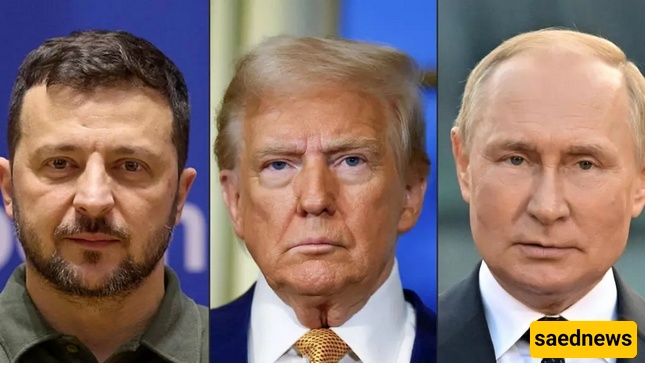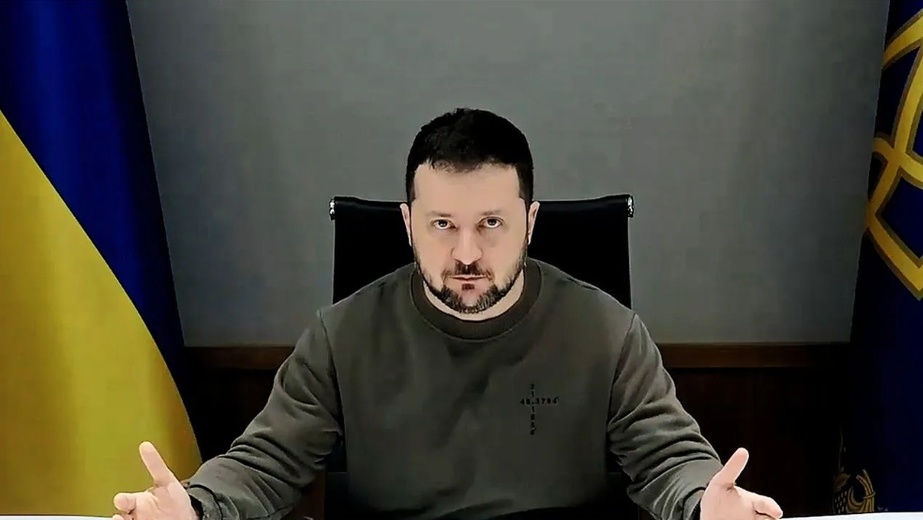SAEDNEWS: On the eve of the controversial meeting between Donald Trump and Vladimir Putin, President of Russia, Volodymyr Zelensky declared in a firm tone that Ukraine is not willing to cede even a part of its territory to Moscow; a position that sends a clear message directly to both the Kremlin and Western allies.

According to SaedNews citing France 24, Volodymyr Zelensky, President of Ukraine, in his latest statement, once again drew a clear red line in Kyiv’s policy: “No part of Ukrainian soil will be ceded to Russia.” These remarks come as the world watches the scheduled meeting between Donald Trump and Vladimir Putin—an encounter likely to impact the dynamics of the Ukraine war and the diplomatic landscape surrounding it.
The Russia-Ukraine war, now entering its third year, has not only altered Europe’s political geography but also challenged the global security structure. Since Russia’s invasion began in February 2022, Ukraine has repeatedly faced various pressures—both from foreign actors and internal forces—to accept agreements that include ceding occupied territories. However, Zelensky has consistently emphasized that any peace deal must be based on the full restoration of all occupied areas, including Crimea.

Zelensky’s recent statements carry more political and symbolic weight than ever. Issued on the eve of the potential Trump-Putin dialogue, they serve as a preemptive message to both parties: Ukraine will not yield under any foreign negotiation pressure. This message also reminds Western allies—including the United States and European countries—that military and financial support for Kyiv remains the only way to uphold this steadfast stance.
Trump, who maintained relatively close relations with Putin during his presidency, has frequently been criticized for his softer approach toward Russia. Now, with his return to the international diplomatic stage and a planned direct meeting with Putin, speculation has intensified regarding his possible stance on the Ukraine war. Some analysts believe Trump might pressure Zelensky for a “quick agreement,” pushing for territorial concessions. Yet Zelensky’s recent remarks are clearly designed to counter such scenarios.
On the other hand, Putin has repeatedly stressed that control over occupied territories—especially the four regions of Donetsk, Luhansk, Kherson, and Zaporizhzhia, which Russia annexed in 2022—is non-negotiable. This position directly conflicts with Kyiv’s demands and has stalled any ceasefire or peace talks. The upcoming meeting with Trump will be an opportunity for Putin to present his narrative to a key American figure, but Zelensky’s response signals that he will show no flexibility even in indirect negotiations.
Internationally, Zelensky’s firm stance has received mixed reactions. Eastern European countries like Poland and the Baltic states strongly support this approach, viewing it as essential deterrence against Russia. However, some Western European capitals, pressured by public opinion to end the war and reduce economic costs, sometimes implicitly speak of the need for “realistic solutions”—a phrase Kyiv interprets as a potential acceptance of territorial changes.
Observers note that Zelensky’s position carries significant domestic importance as well. Any retreat from the policy of full territorial restoration could provoke strong backlash from Ukrainian society, which largely views the war not merely as a military conflict but as a struggle for survival and national identity. Within Ukraine’s political sphere, any territorial concession to Russia is seen as equivalent to defeat and betrayal.
Nonetheless, critics warn that the ongoing war of attrition has imposed heavy human and economic costs on Ukraine, and continuing without a clear horizon could weaken the country’s future position. They argue that insistence on reclaiming all territories, while principled, might be practically and militarily unattainable. However, Zelensky, responding to such criticism, stresses that only a resolute stance can maintain international support and prevent legitimizing Russian actions.
Meanwhile, the Kremlin has not issued a direct reaction to Zelensky’s recent statements, but pro-government Russian media have described them as an “unrealistic position.” Russian analysts claim that without territorial concessions, any peace deal is practically impossible. Still, the diplomatic atmosphere before the Trump-Putin meeting shows that each side is trying to solidify its narrative and red lines before negotiations.
On the ground, fighting in eastern and southern Ukraine continues fiercely. Although front lines have seen no major shifts in recent months, both sides attempt to increase pressure through missile and drone attacks. Military experts say that without significant changes in armaments or external support, the current stalemate may persist for a long time.
Zelensky’s recent statements essentially reaffirm this key message: Ukraine, even under difficult conditions and international pressure, will not retreat from its national sovereignty principles. Whether this stance can prevent any compromise plan in the Trump-Putin meeting depends on various factors—including Trump’s willingness to broker a swift deal and Zelensky’s ability to sustain his allies’ support.
Ultimately, Zelensky’s message is a clear warning to all parties involved: the Ukraine war is not just about geography, but about upholding international order principles, respecting recognized borders, and the right of nations to self-determination. His words respond not only to Putin but also to any international actor who might think political pressure or promises of quick peace can coerce Kyiv into compromise. Whatever the outcome of the Trump-Putin meeting, Zelensky’s current position indicates that the road to peace remains difficult, costly, and heavily dependent on Ukraine’s political will and its supporters.

